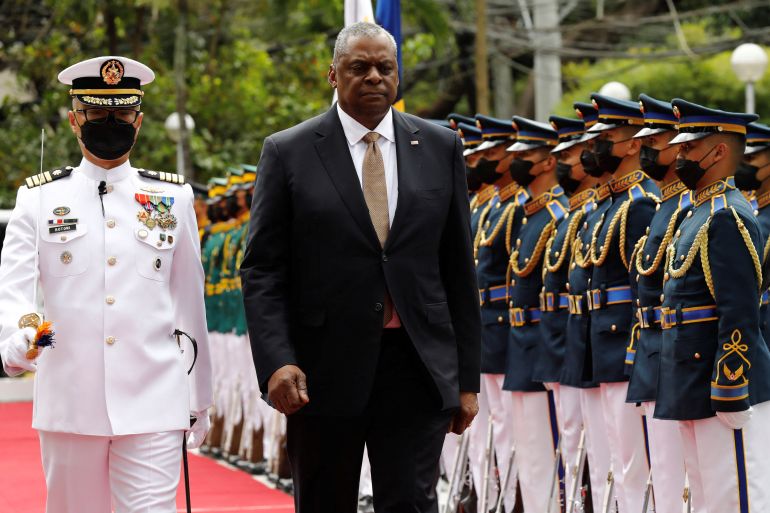DEVELOPING STORY,

Philippines agrees to allow US wider access to military bases
Move comes amid concerns about China’s assertiveness in the disputed South China Sea and over self-ruled Taiwan.

The Philippines and the United States have agreed to expand their defence pact, with US troops allowed access to four more military bases in the Southeast Asian nation, according to a joint statement from the two countries’ defence departments.
The agreement was unveiled during a visit to Manila by US Defense Secretary, Lloyd Austin, during which he held talks with Philippine President Ferdinand Marcos Jr, who took office last year.
“The Philippines and the United States are proud to announce their plans to accelerate the full implementation of the Enhanced Defense Cooperation Agreement (EDCA) with the agreement to designate four new Agreed Locations in strategic areas of the country and the substantial completion of the projects in the existing five Agreed Locations,” the joint statement said. It was published on the websites of the US Department of Defense and on the Philippines’ Department of National Defense.
EDCA forms part of a decades-long security alliance between the US and the Philippines, and allows US troops to rotate through five Philippine bases, including those near disputed waters.
It also allows for the US military to store defence equipment and supplies on those bases.
The statement said the expansion would make the two countries’ alliance “stronger and more resilient” and “accelerate modernization of our combined military capabilities”.
The statement did not elaborate on the new locations, but said they would “allow more rapid support for humanitarian and climate-related disasters in the Philippines”. The US had allocated more than $82 million towards infrastructure investments at EDCA’s existing five sites, it added.

The expansion comes as China becomes increasingly assertive in pressing its claim to the self-ruled island of Taiwan, as well as in the South China Sea where it claims almost the entire waterway under its controversial nine-dash line. The Philippines, other Southeast Asian nations and Taiwan also have overlapping claims to the sea, which is a major global trade route.
The relationship between the Philippines and the US – longtime allies – was strained under Marcos Jr’s predecessor Rodrigo Duterte, who favoured China and threatened to sever ties with Washington and expel US troops.
But ties have warmed under the new administration, with US Vice President Kamala Harris visiting last November.
“This is really the dawn of a new era after a rocky few years,” said Al Jazeera correspondent Barnaby Lo, who is in Manila.
Tension in disputed seas
While most of the new bases are expected to be in Luzon, the western island of Palawan, facing the contested Spratly Islands in the South China Sea, is expected to get an additional base as well.
A senior US defence official told reporters on Wednesday that the Philippines was under “day-to-day pressure from (China) in ways that contravene international law”.
The US aims to ensure “they have the capability to defend their own sovereignty”, the official said.
The US aims to ensure “they have the capability to defend their own sovereignty”, the official said.
The Philippines has often found itself on the front line of Beijing’s aggressive tactics in the South China Sea, where China’s maritime militia has established an almost constant presence in Manila’s exclusive economic zone.
In 2012, China took control of Scarborough Shoal from the Philippines after a months-long standoff that began when Manila discovered Chinese fishing boats around the rocky outcrops.
Tensions rose again in 2021 when the Philippines protested against China’s “continuing illegal presence and activities” near its islands in the South China Sea.
Beijing has ignored a 2016 international court ruling – in a case brought by the Philippines – that its claim to the South China Sea was without merit.
China also claims democratic Taiwan as part of its territory and has not ruled out the use of force to achieve its objective. Last year, after then US House Speaker Nancy Pelosi visited the island, Beijing conducted major war games around and across the island.
SOURCE: AL JAZEERA AND NEWS AGENCIES







